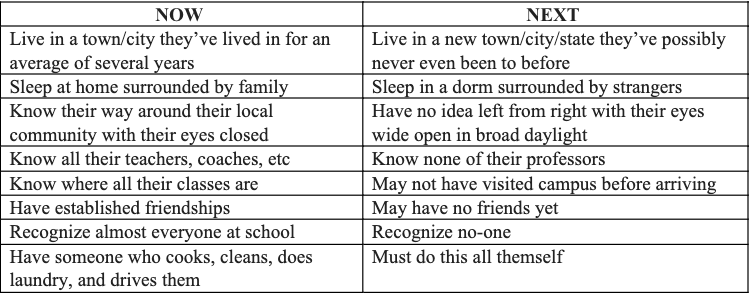Wrangling with Uncertainty When You’re University Bound: Expected Angst or Something more Serious?
Wrangling with Uncertainty When You’re University Bound: Expected Angst or Something more Serious?

You could not be happier for your child/nibling/client. They’ve finally made it to grade 12 and have been wanting to leap into their future for ages. After some visits and virtual exploration, they’ve narrowed down their university/college/program search and sent off the applications. You thought now would be a quiet and calm few months as they wait to hear back, but instead it seems as though their anxiety is reaching new heights. Should you be concerned?
The Past: Using a developmental lens
It's no surprise that awaiting this type of news would cause some anxiety. After all, grade 12 students have spent an average of 13 years in school where everything is structured and predictable. Their past feels familiar and (hopefully) safe, whereas what lies ahead can feel uncertain and risky. Youth are preparing to launch into the next chapter of their young lives which is likely to be very different. Understanding this anxiety from a developmental perspective can help us, help them to recognize the change ahead and normalize the inherent uncertainty.

It’s a lot to take in, this next phase of life when compared to the here and now, but most youth are in fact ready. Although they may experience waves of fear and uncertainty, its helpful to remind them of personalized examples that demonstrates their readiness. And reminding them they will survive, and are likely to even thrive, calms unwanted anxiety. When we use a developmental lens, it can assist our youth to recognize that the central nervous system produces anxiety to be helpful, to alert them to the importance of this next step and to prepare them for the small possibility of threat and danger. But the anxiety needs to be small and manageable, and big surges of persistent anxiety may be a clue that something is awry.
The Present: Doing an ACTS Assessment
The ACTS acronym can assist you supporting your child/nibbling/client to do some careful self-reflection and determine if their anxiety is routine senior angst, or perhaps a flare up in their mental health:
Activities: How many activities is this anxiety affecting or impacting?
Controllable: Does the anxiety function like a light switch that can be turned on/off or is it more like a dimmer switch- only dialing up or down, but never off?
Time: How much time does this anxiety take up in an average day? Minutes or hours?
Scale: Using a 0-10 scale how much of a problem is this anxiety causing each day? 0 indicates none, 5 a medium amount, and 10 is a lot.
The greater number of activities impacted by anxiety, combined with the length of time each day, and the higher the scaled score, the more likely the situation is no longer typical grade 12 angst and may be something else. This is further compounded by the sense of control one has over the worry. If your youth can turn off worry through focused attention on other things (e.g. schoolwork, friends, a job, family, etc.), their sense of control can negate some of the other negative effects of anxiety.
The Future: Becoming an Active Participant
With a developmental perspective and a rough severity estimate, all that remains is to determine whether the youth feels as though they have a sense of agency and view themselves as an active participant in their own future. Youth with this mindset believe that despite the future uncertainty they can rise to the task, they have confidence in their ability to do things to feel better and can identify people near and far who have their back. This is in contrast to the student who feels buoyed along by the waves, a passive recipient of whatever happens. Their sense of lack of control and engagement can generate excessive anxiety as well as low mood and lack of motivation. These youth may lack self efficacy and believe their future is in fate’s hands.
The Past -The Present -The Future
Having some mild to moderate anxiety in the “waiting months” before a final decision has been made and the deposit paid, may be par for the course and representative of typical Grade 12 angst. These youth understand and accept the pending change is part of growing up, and don’t experience excessive anxiety impacting more activities than not, lasting 1 or more hours a day. Ultimately, they view themselves as an active participant in their future. However, if things look quite different for your child/nibbling/client now is an excellent time to seek professional help. Ensuring your youth has the supports to help them move beyond high school is the goal. Anxiety should not stop them from “going for it,” it just requires some thoughtful planning and a gentle hand to be the safety net beneath.


















